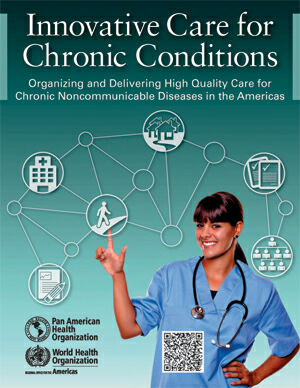Innovative Care for Chronic Conditions - PAHO report
 A new report from the Pan American Health Organization/World Health Organization (PAHO/WHO) advances a new model for integrated care of noncommunicable diseases such as heart disease, diabetes, cancer and chronic obstructive pulmonary disease, among others.
A new report from the Pan American Health Organization/World Health Organization (PAHO/WHO) advances a new model for integrated care of noncommunicable diseases such as heart disease, diabetes, cancer and chronic obstructive pulmonary disease, among others.
Noncommunicable diseases (NCDs) are a growing problem in the Americas, where they cause nearly 4 million deaths each year. Research shows that globally, the vast majority of those affected by NCDs do not receive adequate care. Only about half of people suffering from NCDs are diagnosed, only half of them receive medical care, and only 1 in 10 is treated successfully.
The new PAHO/WHO report, Innovative care for chronic conditions: Organizing and delivering high quality care for chronic noncommunicable diseases in the Americas, proposes an integrated Chronic Care Model for addressing NCDs in the context of primary health care. The report also provides practical guidance for health care program managers, policymakers, and those involved in planning and delivery of services for patients and people with NCD risk factors.
The publication discusses key implications of integrated management of NCDs at the policy level, including financial and legislative aspects of on health care and human resources development. It lists examples of effective intervention for each component of the Chronic Care Model and highlights country-based examples of good practices in NCD care.
The report argues that it is critical to integrate primary health care–based chronic care into existing services and programs and to consider chronic diseases not in isolation, but rather as one part of the health status of individuals, who may be susceptible to many other health risks.
Improving the health of chronic disease patients requires a change from essentially reactive health-care systems, primarily focused on treating people are already sick, to proactive systems that are focused on keeping people as healthy as possible, the report says.
Care should be integrated across time, place, and conditions, and members of health-care team should collaborate with one another as well as with patients and their families to develop treatment goals, plans, and implementation strategies that are centered on patient needs, values, and preferences.
The report makes 10 recommendations for organizing and delivering high-quality care for NCDs in the Americas:
- Implement the Chronic Care Model in its entirety.
- Ensure a patient-centered approach.
- Create (or review existing) multisectoral policies for NCD management including universal access to care, aligning payment systems to support best practice.
- Create (or improve existing) clinical information system including monitoring, evaluation and quality improvement strategies as integral parts of the health system.
- Introduce systematic patient self-management support
- Orient care toward preventive and population care, reinforced by health promotion strategies and community participation.
- Change (or maintain) health system structures to better support NCD management and control.
- Create primary health care–led networks of care supporting continuity of care.
- Reorient health services creating a chronic care culture including evidence-based proactive care and quality improvement strategies.
- Reorganize health workers into multidisciplinary teams, ensuring continuous training in NCD management.The report concludes that there is no single formula for developing efficient health systems. However, these 10 recommendations are useful for any health system that seeks to improve integrated care for chronic noncommunicable diseases.
Download full report